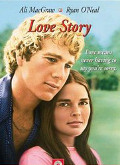
Directed by
Arthur Hiller
96 minutes
Rated PG
Reviewed by
Bernard Hemingway

Love Story (1970)
A surprise smash hit in 1970 this soap-opera-ish, well, love story, based upon Erich Segal's best-selling short novel of the same name made a star of Ali McGraw and helped make Paramount into Hollywood's leading studio of the decade. It was nominated for seven Academy Awards including Best Picture, Best Actor (Ryan O'Neal), Best Supporting Actor (John Marley), Best Actress (Ali MacGraw), Best Director (Arthur Hiller), and Best Original Story and Screenplay (Erich Segal) but, to the Academy's credit, only managed an Oscar for its plinking piano score by Francis Lai
Whilst the story is magazine tosh, Hiller's understated direction gives it more credibility than it deserves, McGraw and O'Neal are middle-of-the-roadish middle-class to enable a wide audience to identify with them (they make a seamless transition from cheap student digs to groovy New York apartment) and the themes of love and liberation mixed with doom were well-suited to the Zeitgeist. The film's much-mocked tagline, "Love means never having to say you're sorry" is uttered initially by Jenny (McGraw) to Oliver (Ryan O'Neal) in a blubbering reconciliation scene and then repeated rather pointlessly by Oliver to his crotchety father (Ray Milland) at the end of the film.
FYI: The film was followed eight years later by a commercially unsuccessful sequel, Oliver's Story penned by its director John Korty with Erich Segal. Ryan O'Neal returned in the lead, looking better than he did in the original. It is, as sequels go, not bad, bu it often reminds one of a Woody Allen movie without the laughs but what worked with a couple of twenty-somethings seeming much less appealing in thirty-somethings. To compensate, the film ramps up the fantasy investment, pairing Oliver with a wealthy but independent woman (Candice Bergen) and padding out the rather ho-hum proceedings with a trip to Hong Kong but the truth of the matter is that it is, like most sequels, completely gratuitous and, unsurprisingly, the film failed.
Want something different?





